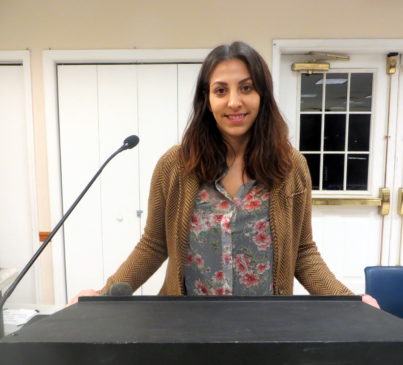
[slideshow_deploy id=’899′]
BY HILLARY VIDERS
SPECIAL TO NORTHERN VALLEY PRESS
ENGLEWOOD, NEW JERSEY —— On Jan. 26, the Racial and Social Justice Team, a committee of the Unitarian Universalist Congregation of the Palisades, held a public meeting in Englewood to discuss the legalization of marijuana in New Jersey.
Marijuana is the most commonly used illicit drug in the United States, according to the Center For Disease Control. The use of marijuana for both medicinal and recreational purposes has been documented as far back as 12,000 years ago, making it one of the earliest cultivated crops.
Today, marijuana is a Schedule I narcotic, in the same category as heroin. But, 29 states allow medical applications, eight states and Washington, D.C. have already legalized use of recreational marijuana and legalization of marijuana is on the agenda of newly-elected Gov. Phil Murphy’s administration.
The possibility of marijuana becoming legal in New Jersey has raised heated public debate on both sides of the aisle. Amongst the opponents are people who argue that marijuana reduces work productivity and that it may be a conduit to more dangerous drugs.

A recent survey of Bergen County police chiefs by Northern Valley Press also found nearly unanimous opposition to legalizing marijuana, citing that it would likely cause a spike in motor vehicle accidents and other inappropriate behaviors that would burden police resources.
A contingent of residents, however, point to the benefits to legalization, such as creating jobs, boosting the economy, providing funds for important social programs and abolishing the racial and social injustice of existing marijuana laws.
Alex Staropoli, Esq., the policy manager for the Drug Policy Alliance (DPA), New Jersey office, was the featured speaker at the recent forum, held at the building that houses the South East Senior Center for Independent Living on Grand Avenue.
Staropoli has worked on a variety of drug policy issues with a focus on criminal justice reform. Prior to joining the DPA, she was the senior policy and legislative analyst for the Governor’s Office of Crime Control and Prevention in Maryland, where she worked on a wide range of criminal justice issues including pretrial justice, substance abuse treatment and overdose prevention, domestic violence and reentry.
On Jan. 26, attendees included members of South East Senior Center for Independent Living and the Unitarian Universalist Congregation, as well as visitors from several towns including Englewood, Teaneck, Fort Lee and Montclair.
Staropoli began her PowerPoint presentation by showing data from the Drug Policy Alliance that indicated that in the states where marijuana is legal, marijuana related arrests have declined dramatically – 98 percent in Washington, D.C., 81 percent in Colorado, 96 percent in Oregon, and 93 percent in Alaska.
The report also found that legal access to marijuana is associated with reductions in some of the most troubling harms associated with opioid use, including opioid overdose deaths and untreated opioid use disorders.
According to the Drug Policy Alliance report, DUI arrests for driving under the influence of alcohol and other drugs have declined in Colorado and Washington, the first two states that legally regulated adult use marijuana markets.
At the same time, states in which marijuana is legal are filling their coffers with hundreds of millions of dollars in marijuana tax revenues. These revenues are being allocated for social good – to fund education, school construction, literacy, bullying prevention, behavioral health and alcohol and drug treatment.
One of Staropoli’s key points was that criminalizing marijuana ruins individual lives, families and communities. Collateral consequences of marijuana arrests for individuals and families include stigma and humiliation, lost hours of work or school, financial burden of legal fees, difficulty of securing employment and lifetime limited earning potential.
For the community, marijuana enforcement diverts resources from genuine threats to public safety, proponents say. New Jersey currently arrests more than 24,000 people a year for marijuana possession and it costs more than $140 million per year to enforce marijuana possession laws in the state.
Another issue at stake is that marijuana arrests have racial disparities, with black people 3.73 times more likely than white people to be arrested for marijuana, according to the American Civil Liberties Union. Although insufficient dates on disparities exist for Latinos due to how they are identified in the criminal justice system in New Jersey, anecdotal data suggests that similar racial disparities exist.
Staropoli then discussed how to create what she described as a fair and equitable marijuana reform. Key components include imposing civil rather than criminal penalties for marijuana activities that occur outside the legal system, expunging criminal records for prior marijuana arrests and oversight to help small business owners get financing for marijuana production.
[slideshow_deploy id=’899′]
The political update
If marijuana is legalized, it will not happen right away. It is a process that can take up to two years. As of now, Senate Bill 830 (introduced by state Sen. Nicholas Scutari) and Assembly Bill 1348 (introduced by state Assemblyman Reed Gusciora) have been introduced, but according to Staropoli, the bills need improvement. Gov. Murphy has said, “I support full legalization.”
The timeline is as follows: On Jan. 9, a new Democrat-dominated legislature was sworn in, and on Jan. 16, Murphy was inaugurated governor. Next up will be legislative public hearings, lobbying and amendments, followed by a vote in both houses of the legislature. The bill then goes to the governor’s desk for signature.
To pass in New Jersey, there needs to be 21 votes in the senate and 41 in the assembly.
After the vote passes, there will be months of rule making to figure out all the details of how a brand new marijuana market would operate – like who will be licensed to grow and sell it, etc.
Although this presentation did focus on the benefits of marijuana legalization, there were some doubters. In the question and answer session, one man asked how safety of the product would be regulated, citing an incident in Colorado where marijuana had been grown using harmful pesticides. Another person wanted to know how legal parameters could be established for impairment while driving a motor vehicle under the influence of marijuana.
Englewood resident Karen Washington said, “I have mixed feelings about this. Kids already get marijuana now, more easily than alcohol, and I am concerned that the regulations may not be strict enough to ensure that the product is pure and doesn’t have additives. On the plus side, it will free our jails of hundreds of African Americans who had only two joints.”
[slideshow_deploy id=’899′]
Arlene Parsano agreed that there are “too many kids in jail. If you have money to get a good lawyer, you get out, but poor people do not have these resources.”
An elderly woman wanted to know if she purchased marijuana legally in New Jersey could she be arrested if she brought it with her to another state where it is not legal.
A concern that several people voiced was that if New Jersey legalized marijuana, would out-of-state opportunists swoop in and capitalize on the profits, rather than have the revenue stay in local communities where it is needed.
Al Stawsky said, “We know that New Jersey is the ‘Garden State,’ but that doesn’t mean that everyone should be allowed to come here and grow weed.”
Many agreed that if marijuana is legalized, the state would need good regulations and a public health campaign that educates people as to how to use it safely.
Photo by Hillary Viders
